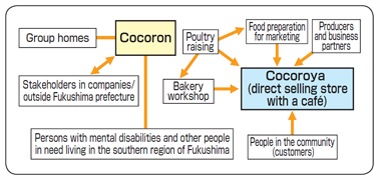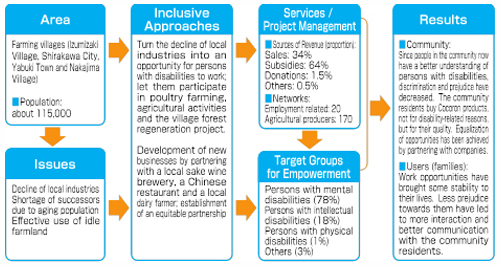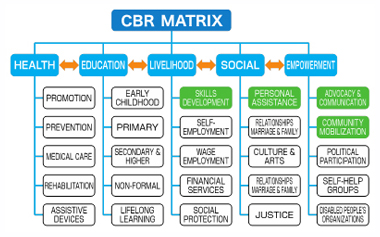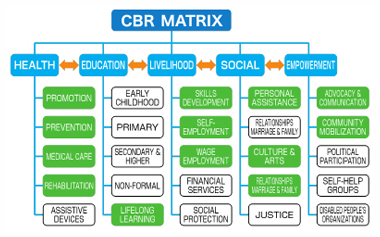Community-Based Inclusive Development
CBID Good Practices
Cocoron (Social Welfare Corporation)
(Izumizaki Village, Nishi-Shirakawa-gun, Fukushima Prefecture)
Key Words Decline of Local Industries, Business Partners, Equal Footing
Cocoron is a welfare service provider, but since it began, it had always been committed to building a community. We established a non-profit organization (NPO) to meet the needs of persons with mental disabilities and to create a community that is comfortable for everyone to live in. Later we also started a café with a direct selling store to offer persons with disabilities a place for work and other activities. Turning the difficulty of finding successors caused by an aging population into an opportunity instead of a problem, we decided to develop and offer several new services. By collaborating with certain companies, we aim to help persons with disabilities achieve equal footing with others. Before the Great East Japan Earthquake, we leased a farmland to produce, process and sell our products.
◆Background
Since there were many people with mental disabilities who were in need of services in the southern region of Fukushima prefecture, having established an NPO, we held workshops for three (3) consecutive years to decide on what kind of facilities and community we should create for them. Eventually, we established a café with a direct selling store.
◆Service Outline
We have been providing consultation services, as well as employment and livelihood support for people with disabilities by running a direct selling store with a café called Cocoroya, as well as group homes. Some of our activities include selling prepared food, baking, poultry farming, vegetable cultivation, and later with the selling of new sweets through partnerships with nearby dairy farms. We have contact with agricultural producers and with the community people for the village forest regeneration project. We host various events that the community people can participate in.
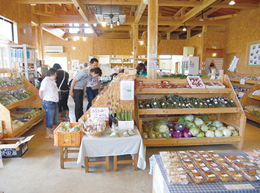
Café Kokoroya with a direct selling store
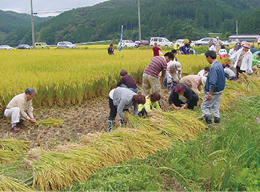
Farming
Basic Data
●Coverage Area: Southern region of Fukushima Prefecture (Shirakawa City, Izumizaki Village, Yabuki Town with Nakajima Village) – Farming areas
●Population: About 115,000 in the coverage area
●Issues: Issues faced by persons with mental disabilities, difficulty in finding young farmers willing to replace aging farmers, the effective use of idle land
■Year of Establishment
In 2002, NPO Cocoro Network Kennan was established. In 2005, it was renamed Cocoron, which became a social welfare corporation in 2011.
■Contents of Services
●Objectives: To provide livelihood and employment support to persons with mental disabilities, and yet our ultimate target is the whole community with the objective of creating a community in which everyone is comfortably living there.
●Purpose of Services and Target Groups: Though the main purpose is to support persons with mental disabilities to live independently, the number of persons we need to empower through our services has reached about 100, including the elderly, as well as persons with physical, visual, intellectual and developmental disabilities.
●Stakeholders: Welfare organizations in Fukushima prefecture, such as the Independent Support Council, employment-related networks, medical institutions, governments, business partners including local farmers, customers of our direct selling store and café Cocoroya, people involved in the village forest regeneration project, Oki Daikichi Honten sake brewery, Shirakawa Engei garden center, and community residents.
●Main Source of Revenue: Payment received for our services provided to persons with disabilities based on the Comprehensive Support Law for Persons with Disabilities, with proceeds from sales
●What We Have Implemented: Consultation services that cover users living in the southern region of Fukushima, including Izumizaki village; management of a direct selling store with a café, and the selling of farm products and local specialties to provide places of work for persons with disabilities; the selling of Cocoroya products at a vacant store in Shirakawa City; selling products by car going around temporary houses for evacuees of the Great East Japan Earthquake; baking workshop; food preparation for selling (at Workshop Nagomi); poultry raising; farming activities/helping farmers; running group homes and home help services for daily living support; employment support for persons with disabilities at regular companies, and dispatch of job couches. In conducting our projects and services, we invite people in the community and aim to benefit everyone involved.
While providing comprehensive and extensive support to meet the various needs of individuals, we have developed and implemented a unique business model by combining welfare, agriculture and nutritional education. For instance, we have partnered with local dairy farms, and jointly developed new sweets using Jersey cow’s milk, and have produced and marketed them. Various new services have been created through joint ventures with companies, too. In total, 62 persons with disabilities are currently working with us after receiving our employment support, and 38 persons got jobs at private companies for the last 10 years.
■Special Festures
■Emphasis on community building
After our NPO was established, there was a need for a new service with the enforcement of the Services and Support for Persons with Disabilities Act. In searching for direction, we invited Mr. Yoshiharu Shimizu as a facilitator. He is the author of “Innovation Should Start with the Weakest, the Smallest and the Farthest” and has gone all over the country to promote community creation. Together with him, we conducted overnight workshops for three (3) consecutive years from 2004. As a result, we decided to make persons with mental disabilities a catalyst for bringing about change in the community, and established Kokoroya, a direct selling store with a café, to involve and give support not only to persons with mental disabilities but also to persons with other disabilities. Those discussions were participated in by local farmers and mental health workers, too.
■Tackling the decline of local industries
At a poultry farm we have taken over from an elderly farmer, persons with disabilities are now looking after 2,000 chickens. To make good use of high-quality eggs produced there, we have established a baking workshop to sell native sweets.
There are many farmers living around Cocoron who have problems with finding successors. Out of Cocoron’s 170 business partners, 120 are farmers. Cocoron holds regular meetings with farm producers. It has been engaged in farming before the Great East Japan Earthquake, and having cultivated leased farmland, Cocoron now produces about 50 kinds of organic vegetables. At the Cocoron farm, 12 workers out 15 are persons with disabilities. Our award-winning pumpkin puddings, made of pumpkin and eggs produced here, are very popular. For the village forestry regeneration project using idle farmland, we have hosted an event planting rice for cooking sake wine by partnering with a local brewery and a garden store.
Therefore, we have been able to turn a community problem of shortage of successors caused by an aging population into an opportunity to create jobs for persons with disabilities and to connect them to the society, while successfully diversifying our business that covers production, processing and marketing.
■Equal footing with business partners
Cocoron has been able to develop and implement new businesses through encounters with companies that have great empathy for our work.
The dairy farm, Shinrin no Bokujo, was established by a company called Amita, and soon after it started, the Great East Japan Earthquake unfortunately occurred. The dairy farm was soon to be closed, but one (1) young staff had a strong commitment to continue. The president of Amita had a strong sense that there would be a crisis over the sustainability of earth resources, thus he made “conducting community-based sustainable business” as a corporate vision. Ms. Yoshie Kumada, a Cocoron director, fully shares his vision, and feels that Cocoron is poised at the same direction. It is easier to work with companies that share the same ideas. Using high-quality milk, Cocoron and Shinrin no Bokujo Dairy Farm jointly developed White Pudding and a special marshmallow called Nusch Couleur. The Oki Daikichi Honten sake brewery, which has good ties with Cocoron specially through the Village Forest regeneration project, has helped to make “Tamago-zake” hot rice wine with eggs and sugar. We have also produced Thai curry in retort pouch, with the help of a local Chinese restaurant. In the field of welfare, the roles of service providers and beneficiaries tend to be fixed permanently, but here at Cocoron, we believe that anybody could benefit from working together, and persons with disabilities can be equal partners. Another advantage of partnering with companies is the swift process from development to the marketing of products.
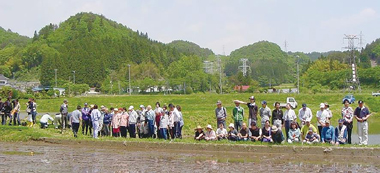
Event related to the Village Forest Regenerating Project
■Welfare and productivity
Cocoron has been able to develop and implement new businesses through encounters with companies that have great empathy for our work.
The dairy farm, Shinrin no Bokujo, was established by a company called Amita, and soon after it started, the Great East Japan Earthquake unfortunately occurred. The dairy farm was soon to be closed, but one (1) young staff had a strong commitment to continue. The president of Amit
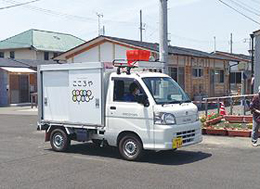

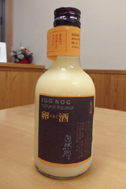
◆How Things Changed
Though Izumizaki Village had debts, the village sold land in lots and was able to pay it off in 2013. People emigrating from cities were craving for cultural events. Cocoron has organized musical concerts and art exhibitions that were made open to community residents, thereby helping to increase their understanding of persons with disabilities. In addition to art exhibitions, we also offer color therapy and tea ceremony class to promote interaction with the community residents. Initially, there was strong prejudice, but as we kept doing things as a community, they have gradually developed a better understanding of persons with disabilities. Prejudice is often felt strongly by persons with disabilities and their families. By participating in the activities of Cocoron, persons with disabilities have acquired some confidence and have broken free from prejudices.
With the farmers who leased land to us, we interact and exchange information on a daily basis, and sometimes help them with weeding. Through such interaction and communication, persons with disabilities have naturally mainstreamed into the community.
Those from outside who pay residential taxes to Izumizaki Village, which is regarded as a donation, may receive special local products. These products include vegetables sold at Cocoroya direct selling store. This shows that Cocoron has won due respect and is well accepted in the village, as packed vegetables are now being delivered all over the country from Cocoroya.
●How persons with disabilities have changed
According to Cocooron, persons with disabilities now have higher motivation for work, more energy and better health. Cocoron also offers persons with disabilities opportunities to empower themselves. Once a month, a meeting is held, which is open to anybody. This provides the clients with disabilities with a place for interaction and mutual help. During my visit there to gather information, I interviewed persons with disabilities who are working at Cocoroya. One (1) male staff, who has been working there for eight (8) years, is responsible for finding defective products. He enjoys conversation with customers in the neighborhood, and whenever he is not at the shop, they become concerned about him. There was another male staff also working for the last eight (8) years at Cocoroya. He said that since he started working there, where he could work at his own pace, he felt secure and comfortable. When asked what has been most challenging for him, he answered, “When I was selling products at the vacant shop space, I had to manage everything from purchasing to marketing.” He did not mention his disability as a difficulty, but the challenge brought on by his work.
By interacting with the people in the community, these persons with disabilities must have started opening up to casual conversation, thereby building self-confidence for greater participation in the activities of the community.
■Current lssues and Way Forward
Ms. Kumada thinks Cocoron should develop according to the times. There are many ideas she brought forth with the stakeholders, which are almost ready to be launched as new projects. All of them require locally available resources to be recycled for further use. One challenge, according to her, is how to share this vision with all concerned.
In the coastal area of Fukushima Prefecture, there have been outreach efforts to support persons with mental disabilities who have been isolated after the nuclear power plant accident; and Cocoron was there as well to cooperate with those activities.
■Analysis Using the CBR Matrix
◆When the NPO Started
Cocoron decided to support the whole community to make it a comfortable place to live in for persons with mental disabilities. For this purpose, it conducted activities that help the community understand persons with disabilities in general. That means it took the twin-track approach from the beginning.
◆After setting up a Social Welfare Corporation
What Cocoron has implemented so far are:
- Employment support for persons with disabilities (Livelihood)
- Communication skills enhancement (Skills Development)
- Better understanding (Advocacy and Communication)
- Mechanisms to let the community participate in Cocoron’s activities (Community Mobilization, Advocacy and Communication)
- Referring persons with disabilities to medical institutions as the need arises (Medical Care)
- Support towards independent living (Rehabilitation)
Though missing in the CBR matrix, Cocoron thinks “Natural Environment” should be included.

